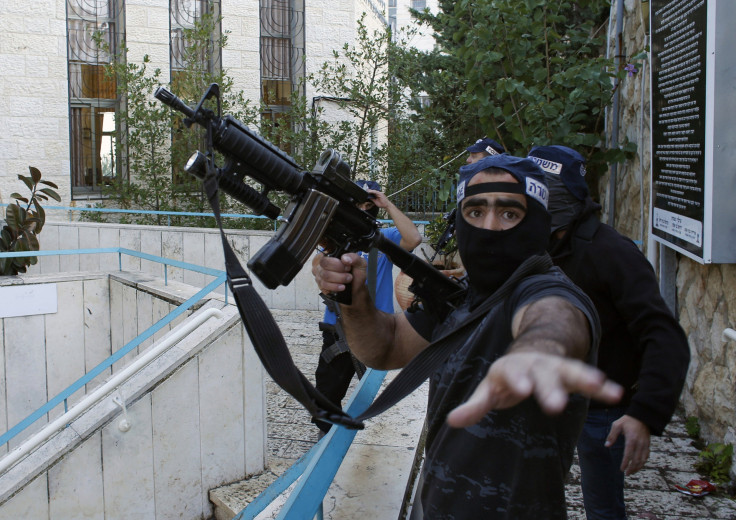What Is The Popular Front For The Liberation Of Palestine? What To Know About The Organization Behind The Jerusalem Synagogue Attack

The Popular Front for the Liberation of Palestine took responsibility Tuesday for an attack in a Jerusalem synagogue that killed four worshippers and wounded eight. Men with axes, guns and knives reportedly traveled through the synagogue during morning prayers before security guards fatally shot them, i24 News reported. They may have shouted "Allahu Akbar," an Arabic phrase meaning "God is great."
The alleged attackers were from the armed wing of the Popular Front for the Liberation of Palestine. Here's what you need to know about the PFLP:
What is the PFLP?
Formed in 1967 after two left-wing factions merged, the PFLP is the second-largest group in the Palestine Liberation Organization, which is recognized as the representative of the Palestinian people. The PFLP originated terrorist strategies like airplane hijacking, according to the Council on Foreign Relations.
The PFLP lost influence after the 1970s due to aging leadership and the rise of organizations like Hamas, the Palestinian Islamist militant government group that wants to destroy Israel in favor of a Palestinian state. The PFLP was further weakened with the creation of the Palestinian Authority governing body in the 1990s. The PFLP sees both governments as illegal, according to a 2010 People's Daily article, but in a 2012 news release it called Hamas as "a vital part of the Palestinian national movement."
Thirty countries, including the United States and the European Union, label the PFLP a terrorist organization, the Daily Beast reported.
Who is in the PFLP? Where are they from?
The PFLP membership is small and focused in Syria, Gaza, Lebanon and the West Bank. The group reportedly has about 800 members. Tuesday's alleged attackers were cousins named Uday Abu Jamal and Ghassan Abu Jamal.
Greek Orthodox Christian doctor George Habash headed the PFLP as secretary-general until he resigned due to health reasons in 2000. Then Abu Ali Mustafa took over through August 2001, when he was killed by two missiles fired into his office. The PFLP's current leader is Ahmed Saadat, who reportedly orchestrated the assassination of Israeli Tourism Minister Rehavam Zeevi in response to Mustafa's death. The Palestinian Authority arrested Saadat for his involvement with the murder in 2002, but in 2006, he was taken from prison by the Israeli military. In 2008, Israel sentenced Saadat to 30 years in prison.
What does the PFLP want?
PFLP members believe in Palestinian nationalism and Marxist Leninism, according to the Anti-Defamation League. They want to create a communist, working-class party, and the best way they see to do that is to liberate Palestine from Israeli rule, according to the Jewish Virtual Library. "The Palestinians should work hard on making the Israeli occupation of our territories illegal by unifying our efforts and ending the internal Palestinian division," senior PFLP member Rabah Muhana told IANS in a statement. He said the PFLP would increase armed resistance and re-establish Palestinians' rights.
The president of the Palestinian Authority, Mahmoud Abbas, condemned Tuesday's attack. Abbas said he denounces any violence and civilian deaths caused by any party, the Jewish Telegraphic Agency reported. "There has to be an immediate stop of breaking into al-Aqsa Mosque and an end of the provocations of settlers and incitement of Israeli cabinet ministers," Abbas said. "There has to be an end to Israeli occupation, defusing of tension and violence."
Why is the PFLP getting involved now?
Tuesday's incident was allegedly a response to the death of a Palestinian bus driver. Yusuf al-Ramuni was found hanged in his bus on Sunday, though his death was ruled a suicide. Palestinian critics consider Ramuni's death a murder. "The attack in Jerusalem is a reaction to the crime and execution of the martyr al-Ramuni and a reaction to the crimes of the occupation," Hamas said, according to the Jerusalem Post. "The Hamas movement is calling for more revenge attacks."
What will happen next?
Israel Prime Minister Benjamin Netanyahu said the "international community is irresponsibly ignoring" the attack, which he said resulted from Hamas and Abbas incitement. "We will respond forcefully to the heinous murder of Jews who came to pray and were killed by debased murderers," Netanyahu said.
© Copyright IBTimes 2024. All rights reserved.












